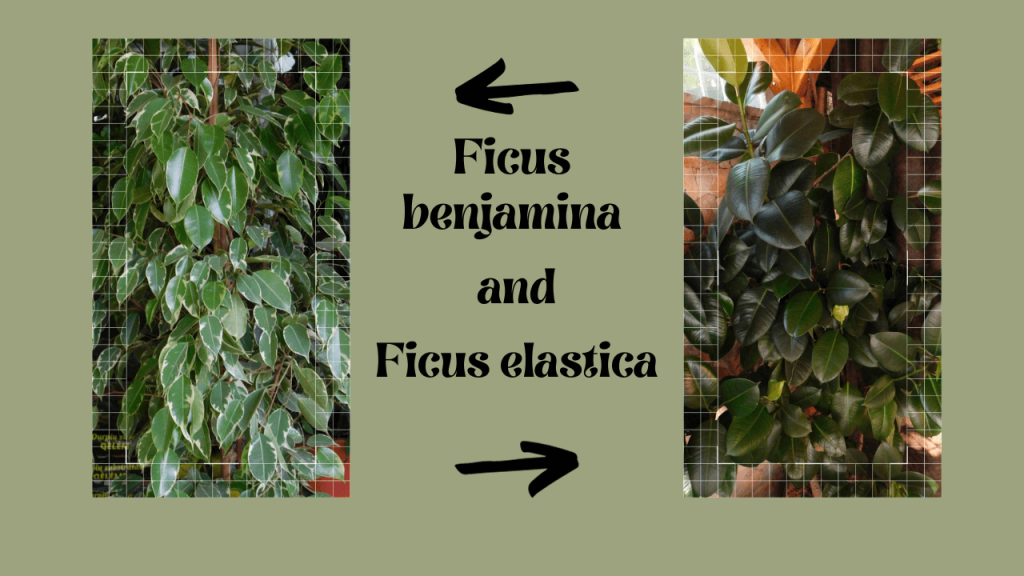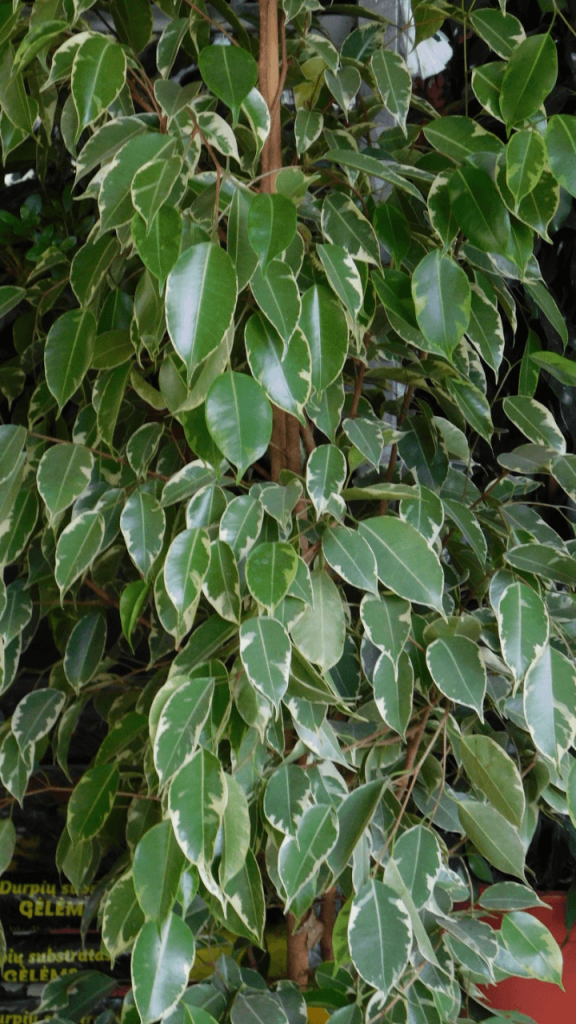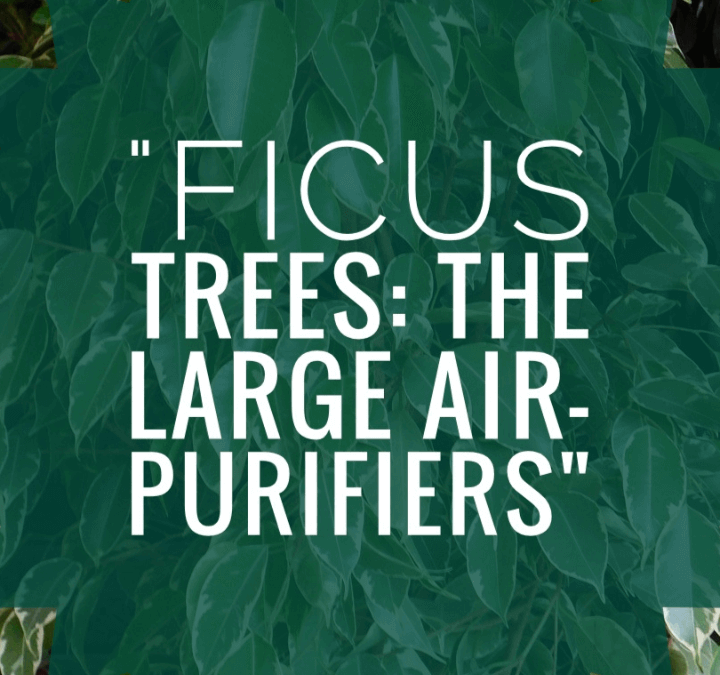Air pollution poses a significant threat to the well-being of our environment and human health. The adverse effects of poor air quality, including respiratory ailments, cardiovascular conditions, and cancer, cannot be overlooked. Indoor air pollution, in particular, is a pressing concern since individuals spend a substantial amount of their time indoors, especially in urban areas where diverse sources like dust, smoke, chemicals, and mold often compromise air quality.
To combat indoor air pollution, the popularity of air-purifying plants has soared as a natural and cost-effective solution. These plants can absorb carbon dioxide and other harmful pollutants while releasing oxygen and water vapor, improving the quality of the air we breathe.
Ficus Trees, renowned for their air-purifying prowess, stand as one of the most effective options available. Additionally, they offer added advantages to indoor spaces, such as stress reduction and aesthetic enhancement. In this blog post, we will delve into the multitude of benefits Ficus Trees provide as air purifiers.
We will explore the best varieties of Ficus Trees suited for this purpose, discuss essential care guidelines, and shed light on the supplementary advantages that arise from incorporating these remarkable plants into your home or office environment.
The benefits of Ficus Trees as air-purifiers
Ficus Trees excel in their ability to purify indoor air, making them a valuable addition to any space. These remarkable trees actively remove pollutants like formaldehyde, benzene, trichloroethylene, and xylene from the air, which are commonly present in household items such as furniture, carpets, and cleaning products. By eliminating these pollutants, Ficus Trees contribute to creating a healthier indoor environment, minimizing the risk of respiratory problems, headaches, and other health issues associated with poor air quality.
Furthermore, Ficus Trees increase the humidity levels within a room by releasing moisture into the air. This feature proves especially beneficial in dry environments where low humidity can lead to skin dryness, respiratory discomfort, and the pesky presence of static electricity.
Beyond their air-purifying and humidifying properties, Ficus Trees have a profound impact on our well-being. Numerous studies have demonstrated the calming effect of indoor plants on the mind and body. By having Ficus Trees in indoor spaces, individuals can experience reduced stress, anxiety, and depression. Moreover, the presence of these plants can enhance cognitive performance and contribute to an overall sense of well-being.
It is important to emphasize that while Ficus Trees are highly effective at purifying indoor air, they should not be considered a standalone solution. Proper ventilation and the use of air filtration systems remain essential for maintaining optimal indoor air quality. Opening windows regularly, employing air purifiers, and minimizing the use of toxic household products are crucial complementary measures to ensure a healthy and refreshing indoor environment.
The best types of Ficus Trees for air purification

Various Ficus Trees are commonly chosen as indoor plants, each with its own air purification capabilities. Here are some well-known Ficus Tree varieties that excel in purifying the air:
- Ficus benjamina: Commonly referred to as the weeping fig, this Ficus Tree is highly popular for indoor settings. It effectively eliminates pollutants such as formaldehyde, benzene, and trichloroethylene from the air.
- Ficus elastica: Known as the rubber plant, this Ficus Tree boasts impressive air purification abilities, specifically targeting formaldehyde and xylene. Additionally, it is a low-maintenance plant that can reach heights of up to 8 feet.
- Ficus lyrata: Recognized as the fiddle-leaf fig, this Ficus Tree efficiently removes formaldehyde and xylene from indoor air. Its large, violin-shaped leaves make it a favored decorative plant, enhancing the aesthetic appeal of any space.
- Ficus microcarpa: Also known as the Chinese banyan or ginseng ficus, this Ficus Tree is adept at eliminating formaldehyde and benzene. Its compact size and easy-care nature have made it a popular choice for bonsai enthusiasts.
When selecting a Ficus Tree for air purification purposes, it is crucial to consider the plant’s size, care requirements, and its effectiveness in removing specific pollutants. Some Ficus Trees can grow quite large and may not be suitable for smaller spaces, while others may have specific light or watering needs. Moreover, certain Ficus varieties may excel in eliminating specific pollutants more effectively than others. Therefore, it is essential to choose a Ficus Tree variety that aligns with your specific requirements and preferences.
How to care for Ficus Trees as air-purifiers
Ficus Trees generally require low maintenance but need specific care to thrive and effectively purify the air. Here are some valuable tips to nurture Ficus Trees for optimal air purification:
Lighting and Temperature Considerations:
Ficus Trees flourish in bright, indirect sunlight. You should place them near a window where they receive plenty of natural light. However, avoid direct sunlight, as it can scorch the leaves. Ficus Trees prefer stable temperatures between 60 and 75 degrees Fahrenheit and are sensitive to sudden temperature changes and drafts.
Watering and Soil Requirements:
Proper moisture levels are crucial for Ficus Trees. They thrive in consistently moist soil, but you should avoid both overwatering and underwatering. Water the trees when the top inch of soil feels dry. Ficus Trees benefit from well-draining soil rich in organic matter. Make sure to plant them in adequately sized pots.
Pruning and Fertilization Tips:
Pruning regularly helps maintain Ficus Trees’ desired shape and encourages new growth. You should fertilize Ficus Trees with balanced fertilizer during their growing season (spring and summer). However, avoid fertilizing during their dormant season (fall and winter).
Identification of Common Pests and Diseases:
Ficus Trees can attract pests like mealybugs, scale insects, and spider mites. You should inspect them regularly to promptly identify any signs of infestation. Ficus Trees can also suffer from diseases like root rot and leaf spot, often due to overwatering or poor air circulation.
Other common indoor plants that act as air-purifiers

While Ficus Trees are renowned for their air-purifying abilities, there is a diverse selection of indoor plants that offer similar benefits. Here are some other commonly found indoor plants known for their air-purifying properties:
Snake Plant (Sansevieria trifasciata): This plant is a low-maintenance option that excels at eliminating pollutants like benzene, formaldehyde, and trichloroethylene from the air. Its ability to thrive in low-light environments makes it a versatile choice.
Spider Plant (Chlorophytum comosum): Known for its resilience and ease of care, the Spider Plant effectively filters formaldehyde and xylene. It’s an excellent choice for hanging baskets or shelves, adding a touch of greenery to any space.
Peace Lily (Spathiphyllum wallisii): With its elegant white flowers, the Peace Lily is both visually stunning and a powerful air purifier. It efficiently removes pollutants like benzene, formaldehyde, and trichloroethylene.
Golden Pothos (Epipremnum aureum): This low-maintenance plant is highly efficient at removing formaldehyde and benzene from the air. Its cascading vines make it an excellent choice for trailing down shelves or hanging baskets.
Boston Fern (Nephrolepis exaltata): Recognized for its lush foliage, the Boston Fern is adept at filtering formaldehyde and xylene. It serves as an appealing addition to any room.
When selecting indoor plants for air purification, it is essential to consider their specific pollutant-removal capabilities, care requirements, and visual appeal. By incorporating these indoor plants into your home or office, you can enhance indoor air quality and enjoy the numerous benefits that plants provide.
Other benefits of using indoor plants for air-purification
In addition to their remarkable air-purifying properties, indoor plants like Ficus Trees offer a multitude of benefits for physical and mental well-being. Here are some additional advantages of using indoor plants for air purification:
Enhanced oxygen levels: Through the process of photosynthesis, plants release oxygen, thus elevating oxygen levels in indoor environments. This can lead to improved cognitive function, reduced fatigue, and overall well-being.
Stress reduction: Scientific research has demonstrated that exposure to indoor plants can effectively lower stress and anxiety levels. This is attributed to the soothing influence of nature and the plants’ ability to improve air quality.
Better sleep quality: Certain plants, such as lavender and jasmine, have been found to promote relaxation and enhance sleep quality. This can result in numerous health benefits, including improved mood, increased productivity, and a reduced risk of chronic diseases.
Increased productivity: Studies have indicated that being surrounded by indoor plants can enhance productivity and boost creativity in work environments. This is likely due to the calming effect of nature, improved air quality, and decreased stress levels.
Improved aesthetic appeal: Indoor plants contribute to the visual appeal of any space, infusing it with a welcoming and natural ambiance. They also create a sense of tranquility and relaxation.
By incorporating indoor plants like Ficus Trees into your home or office, you not only improve indoor air quality but also enjoy a wide range of physical and mental health benefits. Whether you aim to reduce stress, enhance productivity, or simply add a touch of green to your surroundings, indoor plants are an excellent choice.
Impact of Ficus Trees on Urban Air Quality
The role of Ficus trees in enhancing urban air quality is profound and multifaceted, positioning them as valuable assets in the pursuit of healthier city environments. Urban areas, often plagued by air pollution due to high traffic volumes, industrial activities, and dense construction, face significant challenges in maintaining clean air.
Ficus trees, with their robust foliage, act as natural air filters in these concrete jungles. They possess the remarkable ability to absorb harmful pollutants like nitrogen oxides, ammonia, sulfur dioxide, and particulate matter – common contaminants in urban air.
This absorption process not only purifies the air but also mitigates the heat island effect often experienced in cities, as the trees provide shade and release moisture into the air through transpiration, leading to cooler, more pleasant microclimates.
Beyond their direct air-purifying capabilities, Ficus trees contribute to urban biodiversity, offering habitats and food sources for a variety of urban wildlife, thus fostering a balanced ecosystem even within city landscapes. This introduction of green spaces can dramatically transform urban areas, not only ecologically but also socially and psychologically.
The presence of greenery, especially large, leafy trees like Ficus, has been linked to reduced stress levels, improved mental health, and enhanced overall well-being among city dwellers. This psychological uplift, in turn, encourages a more active community lifestyle, promoting outdoor activities and fostering social interactions in greener, more inviting urban spaces.
Moreover, Ficus trees play a significant role in carbon sequestration, absorbing carbon dioxide – a major greenhouse gas – and storing carbon in their biomass. This process is crucial in the fight against climate change, particularly in urban areas where emissions are high. By integrating Ficus trees into urban planning, cities can significantly reduce their carbon footprint, contributing to global efforts in mitigating climate change.
Conclusion
The significance of Ficus Trees in combating air pollution, particularly in urban settings, cannot be overstated. Air pollution, a critical environmental and public health issue, has far-reaching effects, including respiratory diseases, cardiovascular problems, and even cancer. The concern is amplified by the fact that a significant portion of our lives is spent indoors, where pollutants like dust, smoke, chemicals, and mold frequently compromise air quality. Ficus Trees emerge as a natural, effective solution to this problem, offering more than just aesthetic value to our indoor spaces.
Ficus Trees excel in purifying the air by absorbing harmful pollutants such as formaldehyde, benzene, and trichloroethylene, commonly found in household items. This ability to cleanse the air is pivotal in creating healthier living environments, reducing the risk of health issues related to poor air quality. Furthermore, these trees contribute to increasing indoor humidity, which is beneficial in dry environments, alleviating problems like skin dryness and respiratory discomfort.
FAQ About Ficus Tree
Absolutely. Ficus Trees are excellent for offices as they improve air quality and add a calming, natural element to the workspace. They can thrive in office lighting conditions.
Yellowing leaves can be a sign of overwatering, under-watering, or lack of nutrients. It’s important to assess your watering routine and ensure the plant is getting adequate light and nutrients.
Common issues include leaf drop, caused by overwatering, under-watering, or environmental change. Pests like spider mites and aphids can also be a problem.
Ficus Trees purify the air by absorbing harmful toxins like formaldehyde, benzene, and trichloroethylene through their leaves, releasing clean oxygen and improving indoor air quality.

